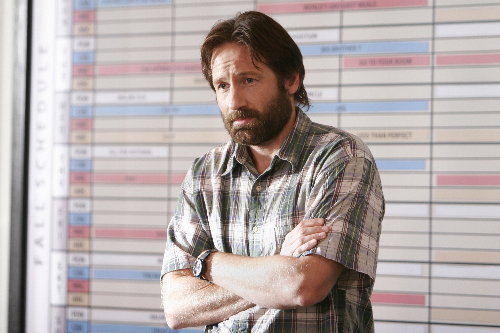Movie Review: The TV Set

There’s no doubt that Jake Kasdan and producer Judd Apatow have been scorned by the TV business with shows like Undeclared and Freaks and Geeks having short runs despite critical acclaim and a rabid, yet small, fan base. Apatow also has The Ben Stiller Show and The Critic under his belt, so he’s been cancelled a lot. But with his recent success in movies, he’s the one laughing.
So, Kasdan and Apatow team up to skewer the TV business, and what we get is pretty much what The Player told us in 1992 about the film industry: that overpaid suits make horrible decisions with someone’s creative vision, test audiences have far too much power in deciding what we see, and it’s an absolute miracle when something actually succeeds (a testament to the kind of thing Mike Judge was going for in Idiocracy, that is, dumb things get on the air and succeed because dumb people watch and love it).
The TV Set’s main player is writer/creator Mike (David Duchovny), who is trying to get The Wexler Chronicles on the air. As the movie explains, a number of pitches are heard for the fall season, a few get produced, and even fewer ever see the light of day (which also means, even fewer than that actually become a hit). He’s got an idea of how he wants the series to go, has actors in mind he wants to play the roles, but he gets resistance from executive Lenny (Sigourney Weaver, in the usual performance of a clueless person in power), and firm but toothless support from new President of Programming, Richard McAllister (Ioan Gruffudd), recently ported in from England.
Mike wants TJ Goldman (Simon Helberg) to play Wexler, but the suits go for broad, annoying Zach Harper (Fran Kranz). Playing the part of his love interest is the cute Laurel Simon (Lindsay Sloane). Zach is a big screw-up, nailing rehearsals but terrible when the camera rolls, but it appears the main problem the suits have is that the story revolves around a man whose brother has killed himself, cited as “too depressing,” a countless number of times. Lenny wants to change that aspect, even though it’s deeply personal to Mike, whose brother actually killed himself.
But creative integrity goes out the door when families are involved: Mike has a kid and another one on the way with wife Natalie (Justine Bateman), Lenny lets her daughter screen shows and basically gives them the approval or disapproval according to her, and Richard is in a troubled marriage with Chloe (the British Office’s Lucy Davis), which causes him to make decisions he normally wouldn’t.
So it’s all pretty average, really. The Player was a much darker, more humorous look at Creativity Gone Wrong, and with people like Kasdan (Zero Effect) and Apatow on board, you’d think they would have a little more to say about the TV industry. Like, for instance, maybe some shots at the Nielsen Ratings or the viewing habits of the average household or the way a show is marketed and possibly set up for failure by its timeslot. Alas, nothing like that is explored here, and it all feels too familiar.
Write a comment
You must be logged in to post a comment.